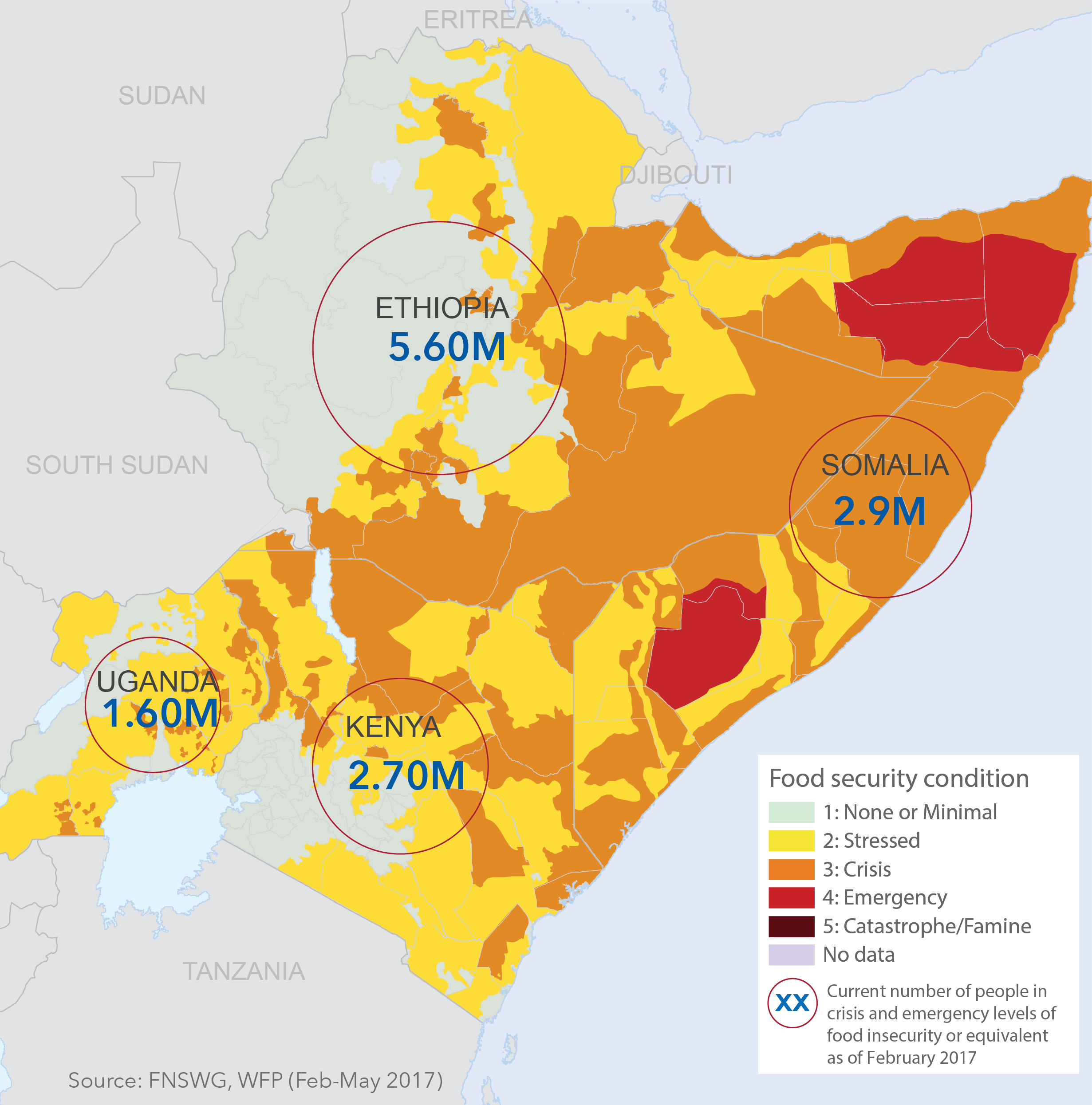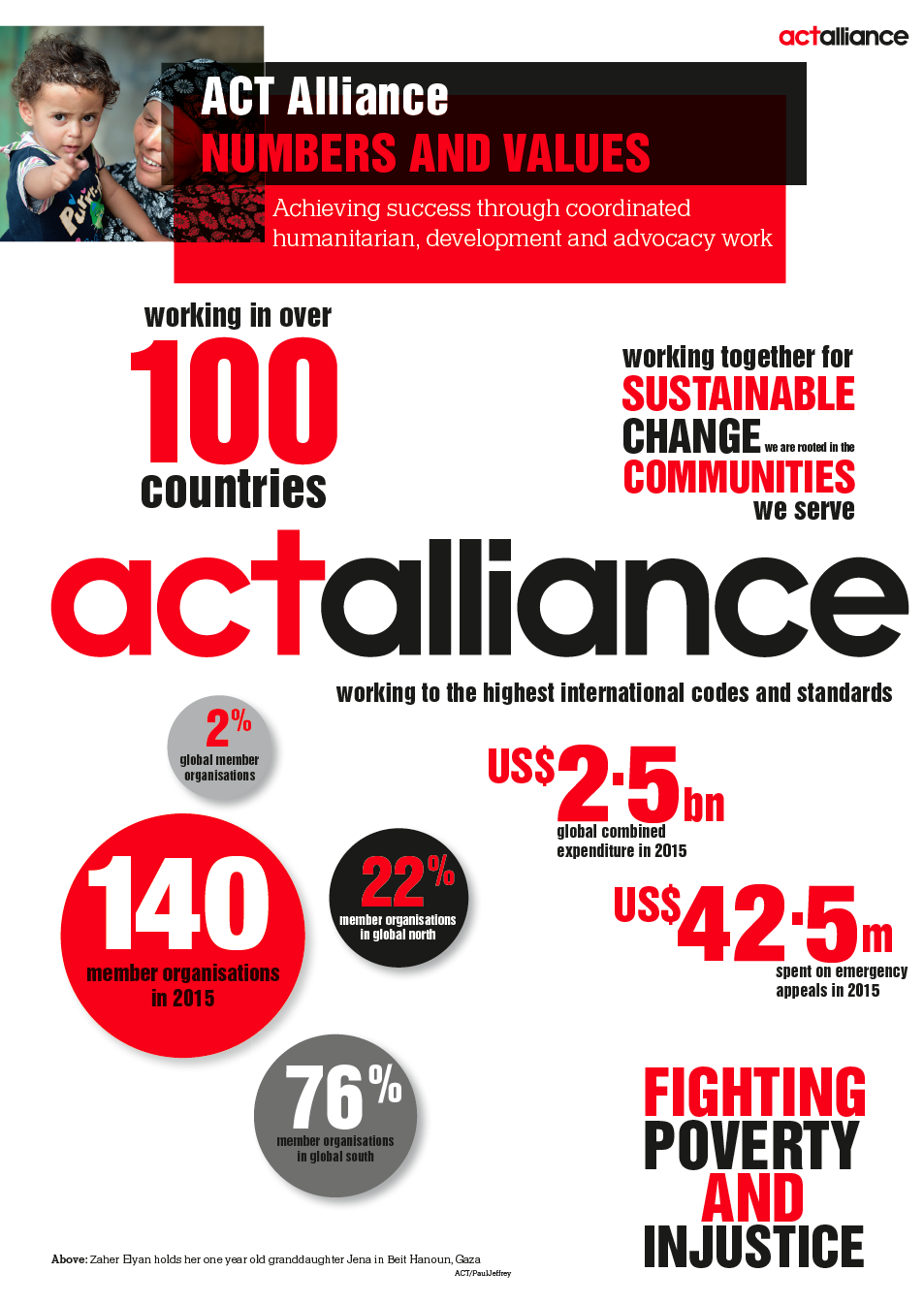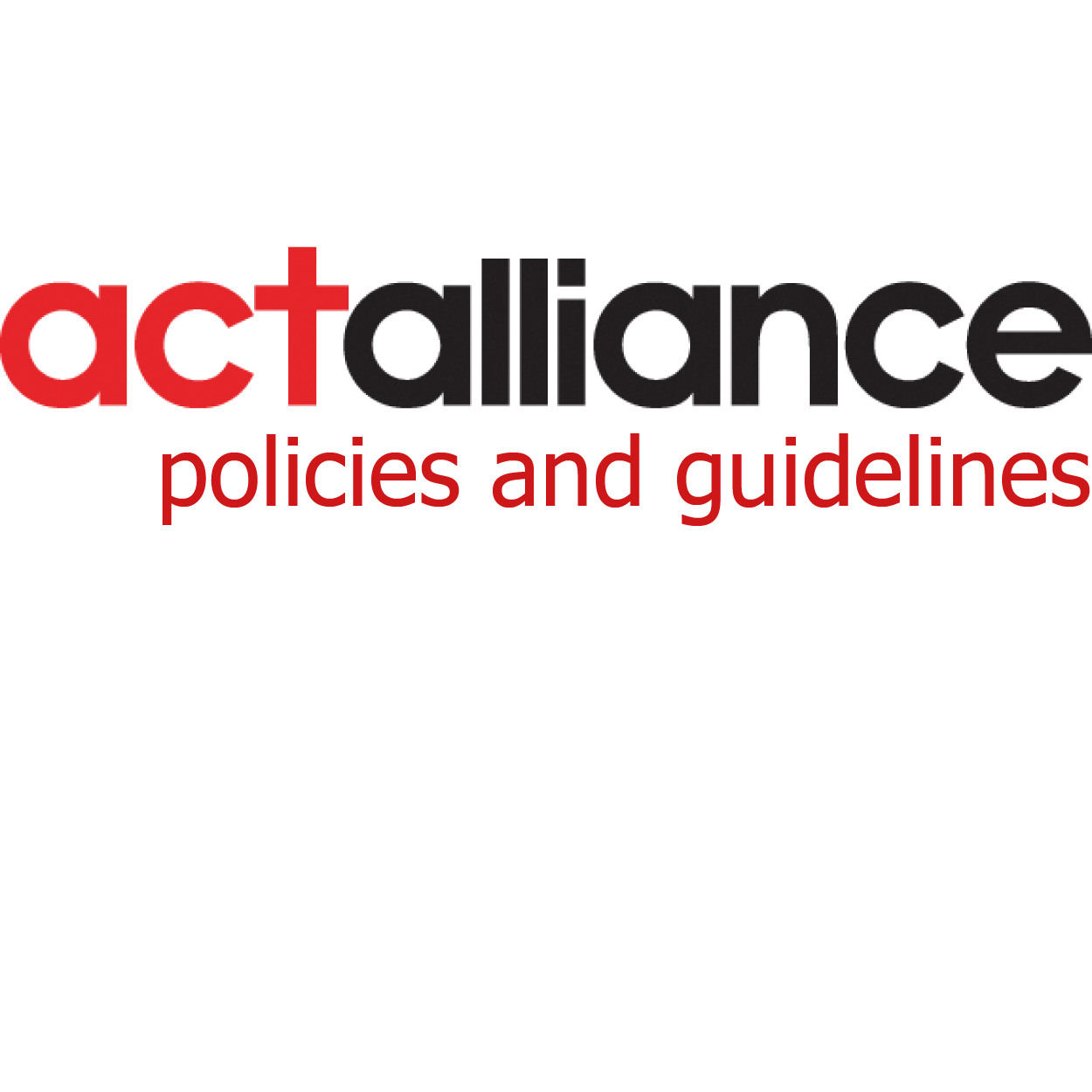
The Horn of Africa is facing its third consecutive year of drought causing thirst and hunger, decimating livestock, destroying livelihoods, spreading disease and triggering large scale population movements. The seriously affected areas include most of Somalia, South Eastern Ethiopia, South Sudan, Norther Eastern and Coastal Kenya, and Northern Uganda. Millions of people are facing the peak effect of severe drought that hit the regions.
Read the ACT statement HERE
The ACT Alliance as a membership-based organisation is committed to providing high-quality humanitarian, development and advocacy programmes and to working in an open and accountable way. The alliance was founded with clear respect for the independence of its members. At the same time, the ACT Alliance has a vested and collective interest in the performance of individual members or groups of members.
In an effort to achieve high quality, ACT strives to meet and even surpass the expectations of its stakeholders, i.e., ACT members and their partners, communities with whom ACT members work, donors, supporters and the public. There may however, be occasions when ACT does not meet the reasonable expectations of all stakeholders at all times. ACT stakeholders have a right to raise a concern, give feedback and if necessary lodge a complaint when this occurs.
The ACT Alliance promotes accountable and transparent ways of working with all stakeholders. It encourages its members and the secretariat to address staff and stakeholder concerns quickly and effectively so that issues are resolved to the satisfaction of the concerned person and do not progress to the level of a complaint. Programme level concerns should be raised and discussed with responsible employees as close to the activity as possible.
Purpose
The purpose of the ACT Complaints Policy is to:
The ACT “Complaints Handling and Investigations Guidelines” provide additional, specific and complementary guidance to ACT members and the ACT secretariat on the key principles underpinning complaints handling and outline the minimum standards for the establishment of complaints handling mechanisms within their own organisations and programmes. These additional guidelines support the implementation of this policy.
The ACT Alliance Complaints Policy is available in English, French and Spanish.
act-complaints-policy-may-2021-en
act-complaints-policy-may-2021-fr
act-complaints-policy-may-2021-sp
(ACT Policy)
Members of the ACT Alliance and the ACT Secretariat have a common commitment to prevent misconduct and to safeguard children. ACT members, together with their partners, support or implement humanitarian, development and advocacy programmes in more than 120 countries around the world. Staff of ACT members and staff of the ACT Secretariat are personally and collectively responsible for upholding and promoting the highest ethical and professional standards in their work.
The management of every ACT member organisation and the ACT Secretariat have a responsibility to ensure that all staff are aware of this Code of Conduct, that they understand what it means in concrete behavioural terms and how it applies to their programme context. Dissemination of this Code of Conduct is supported by ACT guidance and policy documents, namely, the ACT Alliance Guidelines for the Prevention of Sexual Exploitation and Abuse, ACT Child Safeguarding Policy and Policy Guidance Document and the ACT Alliance Guidelines for Complaints Handling and Investigations.
The Code of Conduct applies to all the work performed by all members of the ACT Alliance and defines required behaviour of staff.
The ACT Alliance Code of Conduct is available in English, French and Spanish. The ACT Complaints Policy should be read prior signing the Code of Conduct.
ACT Code of Conduct Policy 2024 EN
ACT Code of Conduct Policy 2024 FR
ACT Code of Conduct 2024 Policy SP
(Policies and guidelines)

The movement of people has been a constant feature of human history. People of good will have for years welcomed the stranger and offered a place of refuge and an opportunity to integrate and contribute to the society. Love and compassion for those in need is not only a central teaching of many faiths, but a strong feature of our humanity. These principles underlie our call for a firm re-commitment to the value of humanity and overcoming the current crisis of solidarity.
In recent years, we have witnessed unprecedented levels of global displacement coalescing in more frequent and drastic crises, which are now commonplace. The international community’s response is increasingly inadequate, and today represents a challenge to both the human rights of displaced people, migrants and refugees, and to international norms and standards. The handling of migration and displacement must be firmly based on international law, recognising the need to enhance rather than further undermine the access to rights and protection of affected people. We affirm the rights of all people faced with displacement, and emphasise the responsibility of governments to secure their rights, protection and dignity.
Displacement and distress migration are key factors hindering our capacity to implement the Sustainable Development Goals and their clarion call to “leave no one behind.”
The United Nations High-level Summit on addressing large movement of refugees and migrants is a welcome opportunity to learn and consolidate efforts to urgently, effectively, and sustainably address the current refugee and migration crisis at all levels. The outcomes must ensure affected people have access to rights and protection, and that their vulnerability is substantially reduced.
A. ACCESS TO RIGHTS
The human rights of refugees, migrants and displaced people are protected under a number of international human rights instruments establishing the basic standards for their treatment. These rights and the dignity of people on the move must be respected by governments and placed at the heart of all initiatives and actions to address displacement and migration. This implies an end to state practices that challenge the effective access to these rights, such as stricter border regimes, expedited and off-territory processing of asylum claims, administrative detention of refugees and migrants, and labour permit regimes favouring employers’ ability to dictate indecent work and take advantage of undocumented migrant workers. It also requires significantly strengthening existing international human rights instruments and ensuring that new governance structures on refugees and migrants currently under negotiation are firmly based on existing international human rights laws, including the proposed Global Compacts on Responsibility Sharing for Refugees and on Safe, Regular and Regular and Orderly Migration.
We call on governments to urgently set up a rights-based mechanism and resources to adequately and sustainably respond to the refugee and migrant crises.
B. PROTECTION OF PEOPLE ON THE MOVE
While human rights violations are a major cause of displacement, people who have been forced to flee face even more rights violations after leaving their countries of origin. Major challenges relate to people smuggling, entry denial into potential host countries, intolerance, xenophobia, racism and blatant discrimination. International efforts are urgently needed to protect and safeguard refugees, migrants and displaced persons from these risks. This implies ensuring access to territory and justice, increased resettlement quotas, sincere efforts to better support the developing countries hosting most of the refugees, and credible, state-led efforts to combat xenophobia and racism. It also requires legal, regular and adequate channels for people who want to migrate or rightfully acquire refugee status, and an end to the criminalisation of migrants and refugees. Furthermore, all states must share responsibility and accountability for refugees, migrants and displaced people. The current scenario in which the vast majority of refugees are hosted by developing countries is neither sustainable nor morally defensible. Developed countries must face up to their responsibilities with increased, dependable and long-term modalities for responsibility sharing on their own soil, and by deploying adequate resources to developing countries hosting large numbers of refugees.
We call on governments to reaffirm, respect, and where necessary, strengthen human rights and international humanitarian law. We also call on them to review policy, practice and laws guiding refugee responses, including for reception, border control and safe passageways.
C. REDUCING VULNERABILITY
Vulnerability to violations of human rights and deprivation of basic human needs are characteristic of forced displacement. This extends beyond the initial situations triggering forced movement, to the dangers experienced en route. Examples from the Mediterranean and Andaman Seas confirm the vulnerability of displaced people to people smugglers and traffickers, with women and children most at risk. Responses to the global migration and refugee crisis must prioritise efforts to reduce vulnerability at all stages of movement, including transit, entry into asylum countries and settlement. They must also apply the humanitarian principles of humanity, neutrality, impartiality and independence enshrined in international humanitarian law in situations affecting displaced people in need of humanitarian assistance. Finally, responses must address the root causes that give rise to forced movement, rather than focusing only on the symptoms.
We call on governments to address the root causes of large movements of people through sustainable and equitable development, including lasting solutions to natural disasters, conflicts and war. We also call on them to address criminal activities and bring to book all individuals, organisations and others involved in trafficking, smuggling, or otherwise violating the rights of migrants and refuges while in the move
ACT Alliance has revised its Humanitarian Policy. This revised 2021 ACT Alliance Humanitarian Policy replaces previous versions. Accompanying guidelines and tools are provided for members in support of this policy which will be continually updated and improved based on learnings from their practical application.
ACT Humanitarian Policy 2021 EN
ACT Humanitarian Policy 2021 SP
ACT Humanitarian Policy 2021 FR


ACT Alliance has a strategic membership composition committed to sharing and working together at all levels and capable of adding value with an effective humanitarian response, high quality long-term development and advocacy. The identity, operations and communications of ACT Alliance inspire member collaboration and strategic relationships as part of the ecumenical movement and civil society and with other faith-based organisations.
As a global humanitarian, development and advocacy network, ACT Alliance recognises the important role of relationships with key stakeholders in the humanitarian and development sectors. In its Founding Document, the alliance made the commitment that “we will build relationships, strengthen effectiveness and avoid duplication through our cooperation.”
The scope of this policy is limited to formal relationships; both short- and long-term, which ACT Alliance aims to develop with institutions which are not members of the alliance. ACT will make an effort to support and benefit from relationships at all levels, taking into consideration the respective contexts. This policy will guide all ACT external relationships in order to enable the alliance to “work closely with other national, regional and international ecumenical, inter-faith and civil society organisations that share similar objectives1.” This policy supports and encourages a range of informal relationships and connection with Faith Based Organisations (FBOs), Civil Society Organisations (CSOs), international organisations including the UN and others, and will support existing relationships of members. It will neither prescribe nor limit the ability and possibility of members and forums to engage with a wide spectrum of stakeholders. External relations will be guided by the alliance’s vision and mission.
ACT External Relations Policy 2016 E